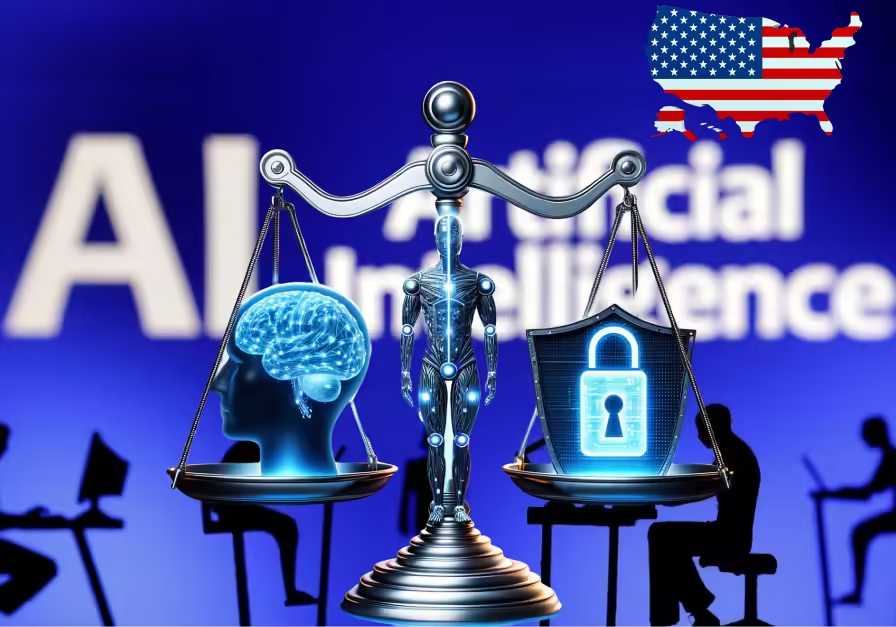The United States has unveiled an ambitious AI Strategy Framework aimed at establishing its global leadership in artificial intelligence. As AI continues to transform industries and economies worldwide, the framework presents a comprehensive roadmap to secure technological and economic superiority for the U.S. on the global stage. It addresses key areas, including research infrastructure, workforce development, ethical standards, and international collaboration, with the overarching goal of ensuring that AI serves societal interests responsibly.
Strengthening AI Infrastructure and Research
At the heart of the AI Strategy Framework is a significant investment in AI infrastructure. This includes funding for research centers across academic institutions, technology hubs, and private sector organizations. By expanding these resources, the U.S. aims to accelerate AI advancements, particularly in foundational research and innovative applications, which will further reinforce the country’s position as a global leader in AI development. This robust infrastructure is essential for the U.S. to remain at the forefront of cutting-edge AI research and foster innovations that benefit both the public and private sectors.
Building a Skilled AI Workforce
Recognizing the need for a skilled workforce to support AI growth, the framework emphasizes education and training in AI, machine learning, and data science. These efforts include expanding specialized programs within academic institutions and creating professional development pathways through apprenticeships and grants. By investing in a diverse, well-trained workforce, the U.S. aims to ensure that its AI talent pool is equipped to lead in various fields, including robotics, automation, and cybersecurity. This focus on workforce development is key to maintaining the country’s competitive edge in an evolving job market shaped by AI.
Ethical AI and Global Standards
The U.S. strategy places a strong emphasis on ethical AI practices and the establishment of global standards. The framework proposes collaborating with international organizations to create guidelines that ensure transparency, accountability, and fairness in AI systems. Ethical AI is essential to prevent misuse and to foster public trust in these rapidly advancing technologies. By setting an example in ethical AI standards, the U.S. not only aims to protect democratic values but also to influence global AI governance in ways that align with responsible innovation and human rights.
Enhancing National Security through AI
A critical component of the framework is the integration of AI into national security and defense strategies. The framework calls for developing defense-focused AI applications that safeguard national interests while adhering to ethical standards. AI technologies in the military and intelligence sectors offer strategic advantages, such as enhanced decision-making and predictive analytics. By prioritizing ethical AI governance in these sensitive areas, the U.S. seeks to maintain a strategic edge and prevent adversaries from using AI in harmful ways. The framework’s emphasis on national security reinforces the importance of AI in securing the nation’s future in an increasingly AI-driven global landscape.
Public-Private Collaboration and Global Partnerships
Collaboration with both the private sector and allied nations is a cornerstone of the U.S. AI Strategy Framework. Recognizing that tech companies are often at the forefront of AI innovation, the framework calls for strengthened partnerships with industry leaders to accelerate advancements and streamline regulatory practices. Public-private partnerships allow the U.S. to pool resources and expertise, ensuring that AI systems align with both societal needs and ethical standards. Additionally, the U.S. aims to work closely with global allies to establish internationally accepted standards that protect the interests of developers and the public alike, fostering a cooperative approach to AI development worldwide.
Economic Impact of AI on U.S. Industries
The framework acknowledges the economic potential of AI and its transformative impact across multiple sectors, including healthcare, finance, manufacturing, and logistics. By integrating AI into these industries, the U.S. aims to boost productivity and create new job categories, effectively offsetting the disruptive effects of automation. The framework envisions a future in which AI drives cost savings, optimizes operational efficiencies, and enhances global competitiveness. As a result, AI-driven economic initiatives promise to fuel growth, create sustainable jobs, and reinforce the U.S. economy in the face of global economic challenges.
Addressing Privacy and Security in AI
Privacy and security remain paramount concerns in the AI Strategy Framework. In response to growing debates over data privacy and surveillance, the framework proposes stringent regulations and oversight mechanisms to ensure AI technologies comply with privacy standards. This is particularly critical in sensitive fields, such as healthcare and law enforcement, where the misuse of AI could have profound ethical implications. By prioritizing privacy and security in AI applications, the U.S. framework seeks to create trustworthy AI systems that respect individual rights and protect against potential abuses.
Mitigating Ethical and Societal Concerns
While the framework is ambitious in scope, it also addresses key ethical and societal concerns associated with AI. The strategy highlights the need to mitigate biases in AI algorithms, protect individual privacy, and manage the risks posed by autonomous systems. By focusing on these challenges, the U.S. aims to develop AI technologies that are not only innovative but also aligned with the democratic values of fairness, equity, and transparency. The ethical dimensions of the framework play a crucial role in establishing AI as a force for good, guiding advancements in ways that benefit society as a whole.
Vision for AI Leadership and Future Outlook
The U.S. AI Strategy Framework represents a decisive step towards positioning the nation as a leader in AI technology. With a focus on infrastructure, workforce development, ethics, and collaboration, the framework aims to foster a vibrant AI ecosystem that drives progress both domestically and internationally. This balanced approach reflects a commitment to harnessing AI’s potential for societal benefit while safeguarding national interests and ethical standards. By shaping the trajectory of AI development, the U.S. is poised to lead the world into a new era of AI-powered transformations, where responsible innovation enhances both economic growth and global stability.
The AI Strategy Framework is a comprehensive blueprint for establishing the United States as a pioneer in AI. Through investments in research, ethical practices, and international partnerships, the framework aims to create a future where AI is a driver of economic growth, a tool for national security, and a technology that upholds democratic values. As the U.S. moves forward with this strategic vision, its leadership in AI promises to set global standards and shape the future of artificial intelligence for generations to come.



